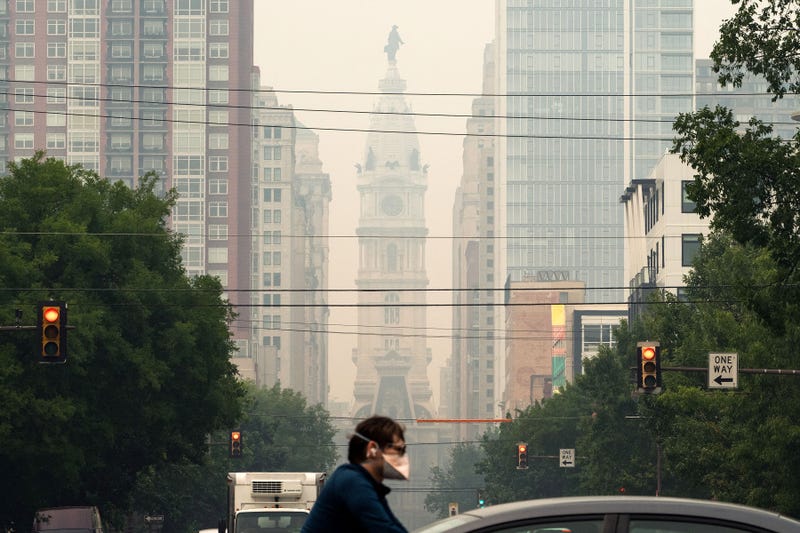
PHILADELPHIA (KYW Newsradio) — The air is not safe to breathe. For anyone.
Thick smoke from the wildfires in Canada has caused dangerous air quality conditions across the northeastern U.S. As of Thursday morning, AirNow’s Air Quality Index for the Philadelphia area is far above the level considered “hazardous.”
Experts expect the situation to gradually improve, but overall, health officials say it is best to stay inside as much as possible and limit exposure to the outdoors, especially for vulnerable groups.
As we wait for the smoke to clear, there are a few precautions people should take — but why? Why can’t we be outside? Why are some recommending masking? What makes the smoke so unhealthy? KYW Newsradio medical editor Dr. Brian McDonough discusses some of the medical advice circulating the situation.
What is the biggest concern with breathing in particulate matter?
Brian McDonough: It’s the inhalation of the particulate matter. Basically, there’s a lot of junk in the air and when you breathe it in, it can get into your lungs. It can make anybody — even really healthy people’s lungs — hyperactive. In other words, they start getting twitchy, they spasm. If you have asthma, it can trigger things that obviously put on stress, if you have heart disease or other issues.
It’s the fact that you’re breathing in such a concentrated amount of that smoke, and we don’t normally see that. Obviously when we have [high] pollution levels, [we] worry about the very young, the very old, people with chronic illnesses. But this is a case where even if you’re in the best condition and the best health, you have to be very careful.
Staying active is very important to a lot of people. And, this is the time of year when more people are doing their workouts outside. Why are people being advised not to do so?
BM: This is like when we have the super hot temperatures, where we have several days in a row where it’s 100, 101 degrees. We tell people this is not the time to play that tennis match or go golfing.
I know it’s disappointing, but it’s not worth the risk. That continued exposure — even for people who are out for a short period of time — they’ll talk about how they feel their throats are a little irritated, they smell like smoke. That’s how bad it is.
People with asthma — particularly, children — are at greater risk. What can parents do?
BM: Make sure [kids] stay inside, and really be alert about it. Also, make sure that they have their inhalers pretty much at all times now — and I’m talking about the rescue inhalers, the ones that you can use when you’re in trouble.
If their prescriptions are not up to date, make sure they get their inhalers [updated]. Do whatever you can to protect them at this time because it’s a real stressor for them. Even if they’re someone who has the occasional attack … this is the type of thing that can really aggravate it.
Why are some recommending mask-wearing?
BM: We’ve been talking a lot about the N95 masks and the importance of it. Remember, we’re not trying to stop an infection here [like COVID-19]. We’re not trying to be perfect. What we’re trying to do is block as much of that junk as we can.
So if you have a mask, even though you might hear “it’s not perfect,” that’s OK. We’re not talking about a virus here. We’re talking about just trying to limit the amount of things out there.
So, No. 1, stay indoors. No. 2, wear a mask when you get outside.
When should someone seek medical attention?
BM: If you find that you’re struggling to breathe or that you just don’t feel right. If you feel that you just don’t feel the same, you’re kind of feeling like you’re out of it or whatever — that also can be a sign of having difficulties with breathing. You have to get [emergency] care. Call 911, do whatever it takes.
Make sure you get seen if you feel you’re in that situation, or if you notice someone else is. That’s what will happen sometimes, it’ll catch up with them. They’re not expecting it. Maybe somebody’s walking or sees them outside and can help them right away.
This is a situation — it’s only going to be a few days, hopefully, and that’s what we're expecting — but for this period of time, we got to be careful.


